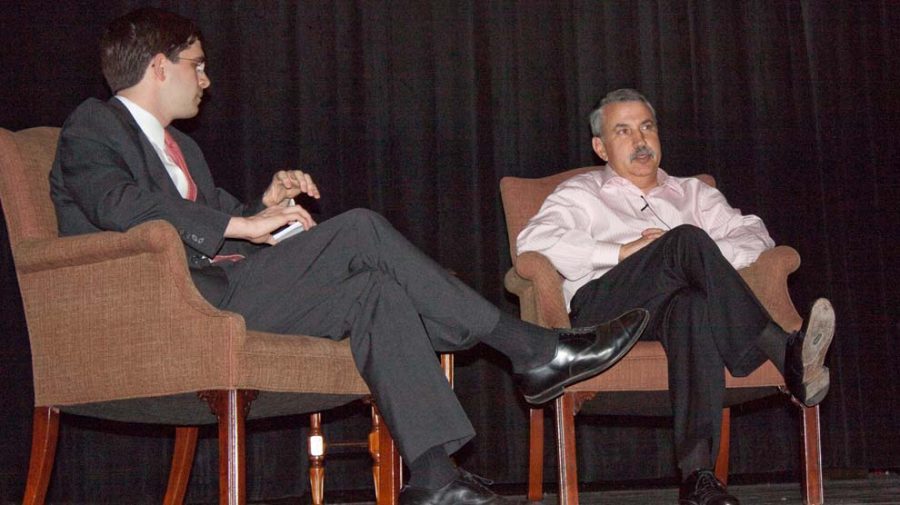Thomas Friedman, three-time Pulitzer Prize winning author and New York Times columnist, said the United States has fallen out of touch with sustainable values to the point of endangering the economy and the environment.
Friedman spoke to an audience in Sellers Auditorium of the Bryant Conference Center on Tuesday evening.
Among the issues he discussed in his “Hot, Flat, and Crowded” speech were the harmful effects of America’s energy consumption that has entered the nation into a losing battle with the laws of economics and of nature.
“When you, in effect, go to war with math and physics, you are courting trouble with the two most emotionless, powerful forces on the planet — the market and mother nature,” he said.
Friedman said, much like the environment, the market operates on principles that do not account for the welfare of humanity unless people change their manner of living within it.
He said as the global population rises and international markets begin to modernize, nations will begin to emulate the American model of living, which will necessitate greater energy consumption.
The convergence of flattening and crowding in the world threatens the supply of natural resources as demand will grow to meet the conditions of modernizing markets, Friedman said.
Halfhearted gestures of environmental activism, such as initiating Facebook groups to target multinational corporations that pollute ecosystems, do not force the culprits of environmental degradation to change their habits, he said.
A movement for an authentic ‘green’ revolution will discard with the quick-and-easy methods of activism Americans have adopted, such as a switch to energy-efficient light bulbs, that he said amounts to nothing more than a party.
“That’s not a revolution,” he said. “That’s a party. We’ve been having a green party.”
Friedman said American legislators could institute a tax of $1 per barrel of oil in 2012 to stifle consumption of OPEC oil and funnel money into public projects, such as the public school system.
“Why not tax something we want people to use less of that will make us more economically secure and make us more strategically secure?” he asked.
Without an economic deterrent to the purchase of oil, Americans will continue to abuse the product, he said.
“No price signal, no green revolution,” he said.
In his speech, Friedman illuminated the problems the college-aged generation will have to confront, said Joe Benson, vice president of research for the University.
“He is really pointing out the issues your generation is going to have to focus on,” he said. “Solving them is going to take time. We’ve got to have a driving force — a force that leads to real change. We’ve got to change the path the country is taking.”
Joe Hardin, associate dean of research for the University, said Friedman identifies solutions to the global energy crisis.
“He’s trying to give some definite steps that people can begin to personalize,” he said. “These are tangible ways people can be involved in changing the mindset [on energy consumption].”









